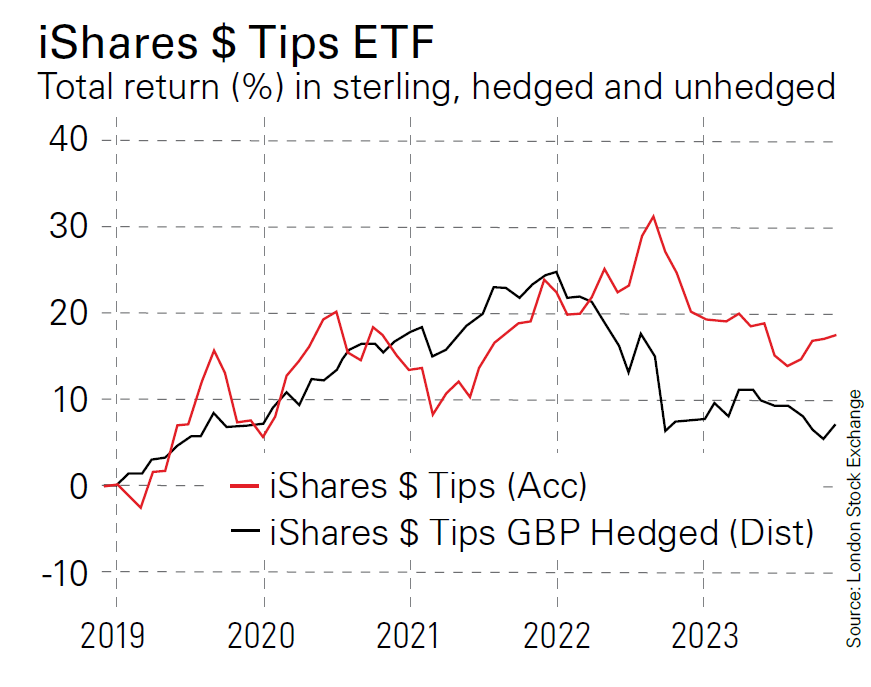Trust in US TIPS to beat inflation
In an inflationary market TIPS, US Treasury Inflation-Protected Securities, are most compelling says Cris Sholto Heaton.


Get the latest financial news, insights and expert analysis from our award-winning MoneyWeek team, to help you understand what really matters when it comes to your finances.
You are now subscribed
Your newsletter sign-up was successful
Want to add more newsletters?

Twice daily
MoneyWeek
Get the latest financial news, insights and expert analysis from our award-winning MoneyWeek team, to help you understand what really matters when it comes to your finances.

Four times a week
Look After My Bills
Sign up to our free money-saving newsletter, filled with the latest news and expert advice to help you find the best tips and deals for managing your bills. Start saving today!
Bond yields have ticked down recently as investors conclude that central banks have finished hiking. Whether this is right remains to be seen, but my long-standing view is that central banks are always too quick to cut and too slow to hike and so I’d guess that markets are probably correct.
However, this has little immediate impact on the MoneyWeek asset-allocation strategy that I’ve been reviewing in the last few weeks, since we try not to forecast too much: our goal is to have a portfolio fit for all likely outcomes. With that in mind, the 2%-2.5% real yield on inflation-linked bonds still looks better than conventional bonds.
Government-backed linkers are an unusually generous gift to investors since they promise to pay you back in a money that retains its value, rather than money that is debased by inflation. It is true, of course, that politicians could potentially fiddle the inflation statistics to some extent, but if they are doing that, actual inflation is likely to be so bad that conventional bonds will lose even more value.
MoneyWeek
Subscribe to MoneyWeek today and get your first six magazine issues absolutely FREE

Sign up to Money Morning
Don't miss the latest investment and personal finances news, market analysis, plus money-saving tips with our free twice-daily newsletter
Don't miss the latest investment and personal finances news, market analysis, plus money-saving tips with our free twice-daily newsletter
There are fewer choices for inflation-linked bond exchange-traded funds (ETFs) than conventional bond ETFs because this is a smaller market, but what’s available is still as much as we need. Most obviously for the UK investor, we have iShares £ Index-Linked Gilts (LSE: INXG). Given that most of us will have liabilities and costs in sterling and be at risk from UK inflation, in principle, it makes sense to have our investment indexed against that. However, as I discussed last time, the UK linker market is structurally messy and so I prefer US Treasury Inflation-Protected Securities (TIPS).
US TIPS Funds

iShares $ Tips ETF Total return (%) in sterling, hedged and unhedged
With TIPS we have a choice of broad funds such as iShares $ Tips (LSE: ITPS), Lyxor Core US Tips (LSE: TIPG) and SPDR Bloomberg US Tips (LSE: UTIP).
There are also a few funds that break the market down by maturity, as with the conventional bond ETFs – for example iShares $ Tips 0-5 (LSE: TP05) or UBS Bloomberg Tips 10+ (LSE: UBTL).
There are also some euro ETFs, such as iShares € Inflation-Linked Government Bond ETF (LSE: IBCI), which is mostly French and Italian bonds and global ETFs, such as iShares Global Inflation-Linked Government Bond ETF (LSE: SGIL), which is around 50% US bonds. But for our purposes, these add little.
First, US linkers have the highest real yields. Second, US bonds are a safe-haven asset – they tend to rally during crises, which is another attractive reason to hold some.
Several of these ETFs are available as currency-hedged funds, such as iShares $ Tips GBP Hedged (LSE: ITPG). Hedging conventional bonds can make sense – the yield you get from bonds can easily be swamped by currency losses if exchange rates move against you. However, in this situation, I see a good argument to hold US linkers unhedged. If UK inflation turns out to be much worse than US inflation, we would expect sterling to weaken against the dollar over time. ITPS has beaten ITPG over five years for this reason (see chart above).
Put all this together, and we will continue to hold 10% in ITPS.
This article was first published in MoneyWeek's magazine. Enjoy exclusive early access to news, opinion and analysis from our team of financial experts with a MoneyWeek subscription.
Related articles
- Index-linked bonds could prove a costly inflation hedge
- Are bonds bouncing back?
- What you need to know about investment funds
Get the latest financial news, insights and expert analysis from our award-winning MoneyWeek team, to help you understand what really matters when it comes to your finances.

Cris Sholt Heaton is the contributing editor for MoneyWeek.
He is an investment analyst and writer who has been contributing to MoneyWeek since 2006 and was managing editor of the magazine between 2016 and 2018. He is experienced in covering international investing, believing many investors still focus too much on their home markets and that it pays to take advantage of all the opportunities the world offers.
He often writes about Asian equities, international income and global asset allocation.
-
 UK unemployment hits highest level since 2021 – will interest rate cuts follow?
UK unemployment hits highest level since 2021 – will interest rate cuts follow?UK unemployment reached its highest rate in almost five years by the end of 2025. Is AI to blame and will the Bank of England step in with an interest rate cut in March?
-
 Did UK inflation fall in January?
Did UK inflation fall in January?After rising in December, analysts expect the next round of UK inflation data to show that disinflation returned in January
-
 Three key winners from the AI boom and beyond
Three key winners from the AI boom and beyondJames Harries of the Trojan Global Income Fund picks three promising stocks that transcend the hype of the AI boom
-
 RTX Corporation is a strong player in a growth market
RTX Corporation is a strong player in a growth marketRTX Corporation’s order backlog means investors can look forward to years of rising profits
-
 Profit from MSCI – the backbone of finance
Profit from MSCI – the backbone of financeAs an index provider, MSCI is a key part of the global financial system. Its shares look cheap
-
 'AI is the real deal – it will change our world in more ways than we can imagine'
'AI is the real deal – it will change our world in more ways than we can imagine'Interview Rob Arnott of Research Affiliates talks to Andrew Van Sickle about the AI bubble, the impact of tariffs on inflation and the outlook for gold and China
-
 Should investors join the rush for venture-capital trusts?
Should investors join the rush for venture-capital trusts?Opinion Investors hoping to buy into venture-capital trusts before the end of the tax year may need to move quickly, says David Prosser
-
 Food and drinks giants seek an image makeover – here's what they're doing
Food and drinks giants seek an image makeover – here's what they're doingThe global food and drink industry is having to change pace to retain its famous appeal for defensive investors. Who will be the winners?
-
 Barings Emerging Europe trust bounces back from Russia woes
Barings Emerging Europe trust bounces back from Russia woesBarings Emerging Europe trust has added the Middle East and Africa to its mandate, delivering a strong recovery, says Max King
-
 How a dovish Federal Reserve could affect you
How a dovish Federal Reserve could affect youTrump’s pick for the US Federal Reserve is not so much of a yes-man as his rival, but interest rates will still come down quickly, says Cris Sholto Heaton